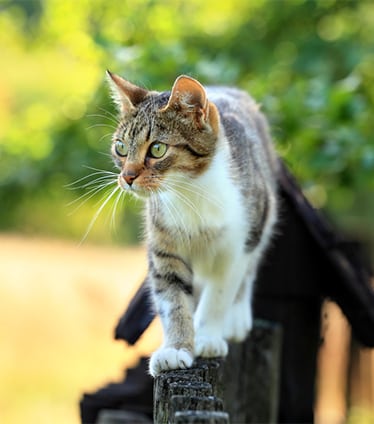Summer Safety Tips for Pet Owners
If your pet loves being outside as much as you do, then it’s important to make their safety a priority. Without proper hydration or adequate protection from the sun, your pet could end up with heatstroke. Additional safety hazards that come with the season include fleas, ticks, and mosquitoes, severe weather, and poisonous plants. With our animal hospital’s summer pet safety tips, we hope to help the pets of Monroeville enjoy their summers to the fullest.
Your pet’s summer safety can be easily managed by following these tips:
Heat Protection
- Too much sun and heat can be dangerous for your pet. Never leave your pet outside or in a parked car unattended. Always keep a supply of fresh water for your pet where they can reach it, and if they need to stay outdoors, have a nice shady spot for them to relax. You may also want to invest in a small wading pool that they can use.
- Limit walks to early morning or dusk when the air and pavement are cooler. Hot pavement burns paw pads and can increase your pet’s body temperature.
- Symptoms of heatstroke can include heavy panting, an inability to urinate, lethargy, excessive drooling, a dry, warm nose, and bright red gums. If your pet is showing signs of heatstroke, bring them to a veterinarian immediately. Do not attempt to splash cold water on your pet or subject them to dramatically lower temperatures. This could put them into shock.
Parasites
- Parasites are most active in summer (but are generally active all year round in some capacity). Fleas, ticks, and mosquitoes are a primary threat. Aside from infestations that can take over your home, mosquitoes can spread heartworm disease and ticks can spread Lyme disease. Provide the ultimate protection with year-round flea, tick, and heartworm prevention.
- Avoid walking your pet through thick brush and forested areas where ticks likely thrive. Check yourself and your pet for signs of ticks and other bugs before entering your home.
Weather Dangers
- Thunderstorms may be stressful for your pet. If that is the case, consider various options to help them stay calm—our veterinarians would be happy to offer recommendations! You should also have your pet microchipped and have their ID tags updated in case they get out of the house and end up lost.
- Tornadoes have certainly been known to occur here in Pennsylvania. Make sure you and your pet have a safe, secure, easily-accessible shelter. Tornadoes are relatively unpredictable, so preparation is key. Have a plan of action, a disaster kit, and proper identification for your pet in case they go missing. If you have a dog, be sure to place them on a secure leash and lead them to safety.
If you have any questions about the information provided, please contact our animal hospital by calling 412-373-8580.
Summer Pet Safety in Monroeville: Cat Enjoying Being Outdoors


